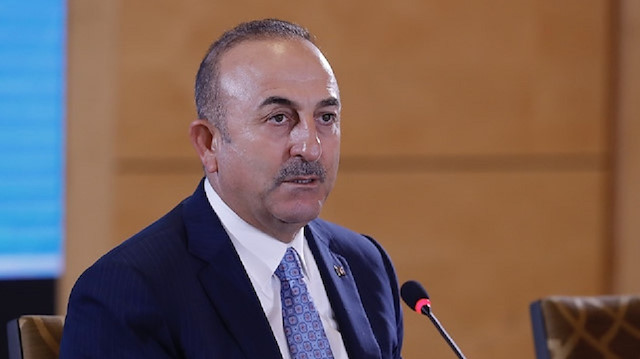

Mevlüt Çavuşoğlu
Ankara will not shrink from threats by U.S. President Donald Trump, said Turkish Foreign Minister Mevlüt Çavuşoğlu on Monday.
"We have repeatedly said that we are never afraid of threats. Threatening Turkey economically will get you nowhere," Çavuşoğlu told a news conference with his Luxembourg counterpart Jean Asselborn in the Turkish capital Ankara.
Çavuşoğlu's remarks came in response to Trump's threat to attack Turkey's economy if Ankara hits the terror group PKK/YPG during the withdrawal of U.S. troops from Syria.
"Strategic partners" should not communicate through social media, Çavuşoğlu added, in clear reference to the perennially tweeting U.S. leader.
"[The US] Will devastate Turkey economically if they hit Kurds," Trump tweeted on Sunday, conflating “Kurds” with the terrorist PKK/YPG, a confusion that Turkey has repeatedly criticized.
Çavuşoğlu said Turkey is not the enemy of the Kurdish people, adding that Kurds should not be equated with terrorist organizations.
He added there is serious pressure on Trump not to withdraw from Syria.
Following the surprise announcement in December that U.S. forces would leave Syria, U.S. officials said withdrawal was conditional on the U.S. not attacking the "Kurds," meaning the terrorist PKK/YPG.
Turkish officials attacked the U.S. conflation of "Kurds" with the terror group, saying a forthcoming Turkish operation in Syria targets a terrorist group which threatens Arabs, Turkmens, and Kurds alike in Syria.
In its 30-year terror campaign against Turkey, the PKK has taken some 40,000 lives. The YPG/PYD is its Syrian branch.
Border safe zone, Idlib
Çavuşoğlu said Ankara is not opposed to a 30-kilometer safe zone inside Syria near Turkey’s border.
"We’re not against this idea. What is our problem? There is a terror corridor beyond our border. There is a terrorist organization that wants to divide Syria. This terrorist organization poses a threat to us. We are targeting this terrorist organization," he added.
About Idlib, Syria, Cavusoglu said that if it becomes a "terrorist nest," the Bashar al-Assad regime and the countries that support it are responsible.
He added that the Idlib deal reached between Turkey and Russia last September, calling for the “stabilization” of Idlib's de-escalation zone, in which acts of aggression are expressly prohibited, has been "successfully" implemented despite difficult conditions.
Under the deal, opposition groups in Idlib will remain in areas where they are already present, while Russia and Turkey will conduct joint patrols in the area with a view to preventing renewed fighting.
Syria has only just begun to emerge from a devastating conflict that began in 2011 when the Assad regime cracked down on demonstrators with unexpected ferocity.

Turkey, Luxembourg
enjoy friendly relations
Turkey and Luxembourg have no political problems and enjoy "friendly" relations, Çavuşoğlu said on Monday.
"We do not have any political problems with Luxembourg, and we are enjoying friendly and allied relations," Mevlut Cavusoglu told a news conference with his Luxembourg counterpart Jean Asselborn in the Turkish capital Ankara.
Cavusoglu said these healthy ties are also reflected in economic relations, as Luxembourg has around $10 billion investments in Turkey, and Turkish firms have invested $1.5 billion in Luxembourg.
"The number of [Luxembourg] tourists coming to Turkey is rising significantly," Cavusoglu said.
Cavusoglu said besides bilateral relations, the top diplomats also discussed the fight against terrorism, Turkey's EU accession process, and Syria.
Asselborn, for his part, said this is his first visit he has paid to Turkey since the 2016 defeated coup.
He said relations with Turkey are "friendly," and Luxembourg supports Turkey's EU bid.
Turkey applied for EU membership in 1987 and accession talks began in 2005. However, negotiations stalled in 2007 due to the objections of the Greek Cypriot administration on the divided island of Cyprus, as well as opposition from Germany and France.
Asselborn on Tuesday will visit various projects in Turkey's southeastern Gaziantep and Kilis provinces for Syrians under temporary protection and speak with local officials.
#Idlib
#çavuşoğlu

